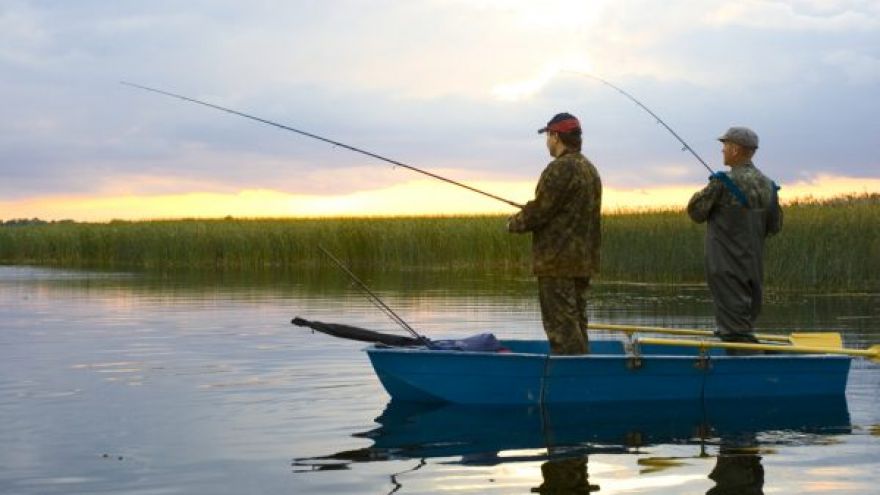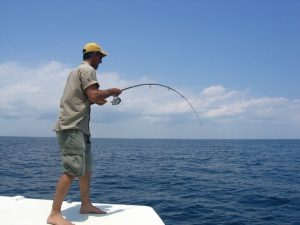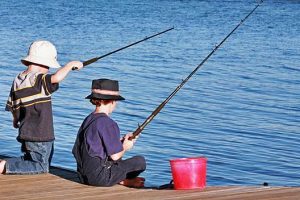The Health Benefits of Fishing
 The Health Benefits of Fishing
gearweare.net
The Health Benefits of Fishing
gearweare.net
While not often associated with the word “exercise,” a day out on the water provides many with the much needed exercise they are missing in their daily lives. While we learn more about the obesity epidemic and search for the means to curb it, much attention has been focused on transforming exercise into an enjoyable experience, versus something that is synonymous with punishment and pain.
The sport of fishing provides an opportunity to get many health benefits from an activity that many people enjoy. By partaking in an activity in which one likes and finds enjoyment in, it increases the likelihood of continued involvement, creating a lifelong exercise commitment.
One may question how the sport of fishing can provide health advantages. While some may doubt the benefits, a quick glance at what is actually happening within your body while fishing will reveal the truths.
Table of Contents
Physical Movement

The key to any exercise program is movement. Regardless of what that movement may be, it is the foundation for which exercise is completed. Your exercise journey while fishing begins the moment you step out of your vehicle and head towards your fishing location. Whether you are scaling onto a riverbank, walking down an established path toward the pier, or hiking into a hidden lake far away from it all, this movement provides the physical movement your body needs on a daily basis for your wellness. Lake Erie steelhead fishing is ultimate fun for every adventurer.
In terms of your heart, this increased movement, however strenuous, encourages the heart to work harder to maintain adequate energy, helping it grow stronger from the exertion.
Once at your fishing hole, the repetitive movements undertaken to cast your line into position, retrieve, and cast again, are all working certain muscles within your body, which, without the fishing experience, would likely remain idle. For example, as you prepare for the cast and bring you rod up in the back cast, you are actively engaging your bicep, shoulder, and forearm muscles. As the cast comes forward, you are still activating your shoulder and forearm muscles, but now are engaging your triceps, as well when you are, for example, catching smallmouth or gulf blue marlin.
All casting motions, whether backward or forward, are actively utilizing our core musculature, which encompasses the muscle groups surrounding our torso area. This area, when weak, is responsible for the majority of back injuries suffered in everyday living. Exposing the central core to any physical fitness greatly increases its strength and decreases the likelihood of one of these debilitating injuries.
It is important to remember that regardless of the lightweight involved in fishing, the movement prevents muscle atrophy or muscle waste. Any movement, no matter how minute, is more beneficial than remaining motionless. Teaching the newly retired to fish can be very good for their physical and also mental health.
Mind and Brain

Being out in nature, among the sights and sounds of nature, free from life’s distractions, concerns, and stressors, creates a mind-clearing utopia which will recharge even the toughest of minds. Taking in the atmosphere will remove the constant stimuli that impedes our ability to think freely and undistracted. An inevitable state of relaxation and calamity comes with time spent outdoors experiencing what Mother Nature has to offer.
In the article, “Stay Happy and Healthy: Go Fishing,” the mental health advantages are summed up well. It states that “Therapeutic experts claim that, because fishing requires focus, it helps take a person’s mind off internal conflict. Locating fish, developing a strategy, choosing the correct fly or lure, and properly presenting that lure to the fish all require critical thinking and creativity, which allow a healthy escape from stress, depression, and anxiety.”
Bon Appetite for Health

Many fish for the experience, embracing the benefits discussed above. However, many out on the water are also out there for the game. Capturing your catch and enjoying their nutritional value also provide health benefits.
Fish, which is known to be some of the healthiest food sources available, possess many healthy characteristics. As a low fat and high protein food source, fish are known to be a grand source of Omega-3 fatty acids. Most people have heard of Omega-3 fatty acids, but many do not know how valuable they are to the body.
The body is unable to naturally produce Omega-3 fatty acids, yet they are necessary for normal metabolism within the human body. Omega 3 fatty acids have been claimed to positively influence the following conditions, as provided by Wikipedia:
- Cancers; including breast and prostate
- Cardiovascular Disease
- Blood Pressure
- Joint inflammations
- Developmental Disabilities; including ADHD, Autism
- Mental Health; including depression and anxiety
Fish also provides a great source of vitamin D, which is a common nutrient lacking in our lives. Vitamin D is responsible for our bone strength due to its effect on calcium absorption in the body. As we age, and our bodies become more exposed to falls, having bone strength to make it through these events is vital to our health and increased quality of life.
In Children

Fishing not only presents health benefits for adults, but can also promote many lifelong healthy habits in children. In addition to breaking them away from the technology of today, it also provides them an opportunity to learn an appreciation for nature, responsibility, and patience.
Children of today are often pulled away from nature, unexposed to the natural inundation that was commonplace generations before. With technology bringing everything to within arm’s reach, the exposure to nature offered to children has greatly diminished. Getting them into nature and experiencing life outdoors gives them a chance to embrace what is outside beyond the walls of their home and school.
By fishing, children will learn the responsibilities of safety and respect. Being around water bodies and other fisherman will require children to understand that their actions could result in unattended consequences. Respecting the space of others, boundaries as not to impede on others, and respecting nature by acting in a reasonable and respectful manner, including not littering and cleaning up after oneself.
And finally, fishing will teach our children the long lost practice of patience. Kid Casters summed it up well in their article, Benefits of Fishing for Kids, where it was said, “If a fish immediately swallowed your hook each time you lowered it into the water, the sport wouldn’t be any fun! Fishing teaches children to be patient and to wait quietly for the things they want.”
Our children have grown up with instant gratification. Everything is immediate and they are rarely exposed to situations in which they must practice patience. You could also read our blog on how to fish with spoons. Taking them fishing uses a fun and unique experience to show them the value of waiting for the reward and the sweeter taste of victory when it is achieved.













